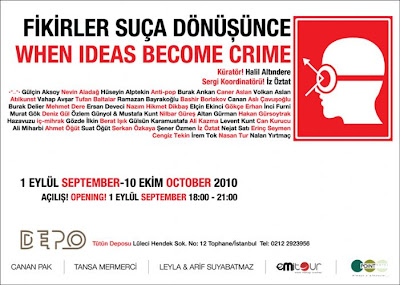28 Ağustos 2010 Cumartesi
21 Ağustos 2010 Cumartesi
Fikirler Suça Dönüşünce/ When Ideas Become Crime
Curated by Halil Altındere, the most comprehensive contemporary art exhibition of the year, brings together 48 artists of different generations from Turkey, who explore the threshold between freedom of expression and crime.
Halil Altındere chooses an (art) historical reference once again for the title of his fifth curatorial undertaking: inspired by Herald Szeeman's exhibition "When Attitudes Become Form", he brings together 48 artists with the slogan "When Ideas Become Crime".
Altındere displays a position of opposition and provocation by presenting political attitudes put forth by artists. One axis of the exhibition is articulated by works, which reflect on militarism, power, hierarchy, nationalism, collective memory, border and gender politics. There is also a more introspective approach, which self-critically reflects on the symbolic economy and power structures among which contemporary art is flourishing.
As it has been with previous Halil Altındere exhibitions, struggles in the cultural field are being organized to empower the collective spirit. The exhibition brings together artists from different generations and multiple geographical locations; İstanbul, İzmir, Diyarbakır, Mardin, Berlin, Frankfurt, Amsterdam and New York. This constellation allows for recognizing similar tendencies as well as starting a dialogue between different artistic and political positions. By bringing together works by Altan Gürman, Gülsün Karamustafa and Hüseyin Alptekin with generations who started their practice in 1990s and 2000s, relationships between generations are constructed. Being the work of an artist-curator, the exhibition supports the production of many new works, as well as opening up an experimental space for context-specific reinterpretation of existing works.
Artists in the exhibition are:
.-_-. , Gülçin Aksoy, Nevin Aladağ, Hüseyin Alptekin, Anti-pop, Burak Arıkan, Caner Aslan, Volkan Aslan, Atılkunst, Vahap Avşar, Tufan Baltalar, Ramazan Bayrakoğlu, Bashir Borlakov, Canan, Aslı Çavuşoğlu, Burak Delier, Mehmet Dere, Ersan Deveci, Nazım Hikmet Dikbaş, Elçin Ekinci, Gökçe Erhan, İnci Furni, Murat Gök, Deniz Gül, Özlem Günyol & Mustafa Kunt, Nilbar Güreş, Altan Gürman, Hakan Gürsoytrak, Hazavuzu, iç mihrak, Gözde İlkin, Berat Işık, Gülsün Karamustafa, Ali Kazma, Levent Kunt, Can Kurucu, Ali Miharbi, Ahmet Öğüt, Suat Öğüt, Serkan Özkaya, Şener Özmen, İz Öztat, Nejat Satı, Erinç Seymen, Cengiz Tekin, İrem Tok, Nasan Tur, Nalan Yırtmaç.
13 Ağustos 2010 Cuma
Sense of Place
Opening: 03.09.2010 / 7.30pm
The theory of landscape or urban movements defines the binding or identification with a place as "Sense of Place". In this project, Gelsenkirchen will become an exemplary laboratory, focusing on ethnic groups. Models of construction like place, space and economic power, phenomena of the global market, and their consequences will be examined. Individual documentary projects will visualise sociospatial areas and their borders, the meaning, experiencing and valuing of urban space as well as physical segregation from the perspective of economic migrants and their children. The project "Sense of Place" invites four artists with a migrant background to look at the sociospatial situation of the area of the programme and to develop work from a participatory and situationist angle.
Two of the artists come from Istanbul, the other two are based in Germany with a migrant background. The artists act as experts on the basis of their own experience. They look at the city from an outside perspective, being at the same time personally affected. The work developed in this project makes the programme area Südost Gelsenkirchen accessible. This project demystifies the construct of "the other"; it enables viewers and participants to experience comprehensible shifts in their views. The concepts of the National, of fear, exclusion and control are not recommendable paths. Through participatory and situationist interventions we would like to influence developments, as well as document sociospatial changes in a manifold way and bring them back into the urban space. We thereby aim at preventing the emergence of situations as in Manchester or many American towns.
H.Khttp://sence-of-place.blogspot.com/
Kaydol:
Yorumlar (Atom)









